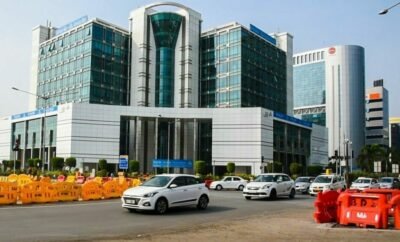Mumbai Financial Capital of India
In the bustling landscape of Indian commerce and trade, one city stands tall as the undisputed financial nerve centre of the nation: Mumbai. Mumbai city has towering skyscrapers, bustling stock exchanges, and dynamic business districts. It epitomizes the spirit of economic prowess and entrepreneurial zeal. As the financial capital of India, Mumbai holds a special place in the hearts and minds of investors, entrepreneurs, and professionals alike, serving as the epicentre of innovation, growth, and opportunity.
-
A Legacy of Commerce and Trade:
The journey of Mumbai as the financial capital of India is traced back to its rich history as a prominent trading port. From the days of the East India Company to today’s globalization, Mumbai has been a hub of commercial activity. It attracting merchants, traders, and entrepreneurs from far and wide. The city’s strategic location on the Arabian Sea, coupled with its well-established infrastructure and vibrant markets, has played a pivotal role in shaping its identity as a centre of commerce and trade.
-
The Rise of Financial Institutions:
The evolution of Mumbai as a financial powerhouse gained momentum with the establishment of key financial institutions such as the Reserve Bank of India (RBI) and the Bombay Stock Exchange (BSE). Founded in 1875, the BSE is not only the oldest stock exchange in Asia but also one of the largest in the world by market capitalization. It serves as the primary platform for trading stocks, bonds, and other securities, playing a crucial role in channelling investment and capital formation.
-
The Gateway to India’s Economy:
Mumbai’s significance as the financial capital extends beyond its role in the domestic economy; it also serves as the gateway to India’s global aspirations. The city is home to numerous multinational corporations, financial institutions, and investment banks, which leverage its strategic location, diverse talent pool, and robust infrastructure to tap into regional and international markets. Mumbai’s status as a cosmopolitan metropolis further enhances its appeal as a preferred destination for foreign investors and expatriates seeking opportunities in India.
-
The Powerhouses of Finance:
Mumbai’s financial landscape is characterized by its iconic business districts. Each represents a distinct facet of the city’s economic prowess. The Bandra-Kurla Complex (BKC), often referred to as Mumbai’s new financial centre, is home to corporate offices, financial institutions, and government agencies. It serves as a melting pot of innovation and collaboration, fostering synergies across various sectors of the economy. Meanwhile, Nariman Point, the traditional business district, continues to exude charm with its waterfront location and iconic skyline, housing the headquarters of leading banks, financial services firms, and conglomerates.
-
Driving Economic Growth:
The financial sector plays a pivotal role in driving Mumbai’s economic growth, contributing significantly to its GDP and employment generation. Beyond finance, Mumbai’s thriving ecosystem of ancillary industries such as real estate, hospitality, and professional services further amplifies its economic impact, creating a multiplier effect that fuels growth and development across the city and beyond. Moreover, Mumbai’s dynamic startup ecosystem, fueled by venture capital and angel investments, is propelling innovation and entrepreneurship to new heights, cementing its position as a hub of innovation and disruption.
-
Challenges and Opportunities:
Despite its many strengths, Mumbai faces a myriad of challenges that threaten to impede its growth trajectory. Congestion, inadequate infrastructure, and regulatory hurdles are some of the key obstacles that need to be addressed to unleash the city’s full potential. Moreover, the widening gap between rich and poor, exacerbated by soaring real estate prices and income inequality, poses socio-economic challenges that require holistic solutions.
However, amidst these challenges lie immense opportunities for Mumbai to consolidate its position as the financial capital of India. Investments in infrastructure, technology, and human capital can enhance the city’s competitiveness and resilience, ensuring sustainable growth for future generations. Moreover, initiatives such as the Make in India campaign and Digital India are poised to transform Mumbai into a global innovation hub. It’s attracting investment, talent, and expertise from around the world.
Why Mumbai is the financial capital of India
Mumbai, formerly known as Bombay, is not just the largest city in India by population, but also the country’s undisputed financial capital. The city’s evolution into a financial powerhouse is the result of a confluence of historical, geographical, economic, and socio-cultural factors. This essay delves into the reasons why Mumbai holds this prestigious position.
-
Historical Context
-
Colonial Legacy
Mumbai’s journey to becoming the financial capital of India began during the British colonial period. The city’s strategic location on the west coast of India, with a deep natural harbor, made it a prime location for maritime trade. The British East India Company developed Mumbai into a major port, and it gradually became the center of trade and commerce in the region.The establishment of the Bombay Stock Exchange (BSE) in 1875 was a pivotal moment in Mumbai’s financial history. The BSE is the oldest stock exchange in Asia and played a critical role in the city’s financial development. It became a hub for trading in shares, commodities, and securities, attracting businesses and investors from across the country and beyond.
-
Post-Independence Growth
After India gained independence in 1947, Mumbai continued to grow as a financial center. The city attracted a diverse population from various parts of India, creating a melting pot of cultures and ideas. This diversity fostered a dynamic and entrepreneurial spirit that is still evident today.
-
-
Geographical Advantages
-
Strategic Location
Mumbai’s location on the Arabian Sea has been instrumental in its development. The natural harbor provided a perfect anchorage for ships, making it an ideal port for international trade. This facilitated the city’s growth as a commercial hub, attracting merchants, traders, and businesses.
-
Connectivity
Mumbai’s connectivity to other parts of India and the world has also played a crucial role in its development. The city is well-connected by road, rail, air, and sea, making it accessible and attractive for business operations. The Chhatrapati Shivaji Maharaj International Airport is one of the busiest airports in India, handling a significant volume of international and domestic flights. Mumbai’s extensive railway network connects it to major cities across India, facilitating the movement of goods and people
-
-
Economic Factors
-
Financial Institutions
Mumbai is home to a plethora of financial institutions, including banks, insurance companies, investment firms, and stock exchanges. The Reserve Bank of India (RBI), the country’s central bank, is headquartered in Mumbai. The presence of the RBI underscores the city’s importance in the Indian financial system.
The city also hosts the headquarters of major Indian banks such as the State Bank of India (SBI), ICICI Bank, HDFC Bank, and Axis Bank. These banks play a critical role in the Indian economy by providing financial services, credit, and investment opportunities. Additionally, Mumbai is the headquarters for numerous insurance companies, including the Life Insurance Corporation of India (LIC) and the General Insurance Corporation of India (GIC).
-
Stock Exchanges
The Bombay Stock Exchange (BSE) and the National Stock Exchange (NSE) are both based in Mumbai. These stock exchanges are the primary platforms for trading in equities, derivatives, and other securities in India. They play a vital role in mobilizing savings for investment and providing liquidity to the financial system.
The BSE Sensex and the NSE Nifty are the benchmark indices of the Indian stock market, reflecting the performance of the largest and most actively traded companies in the country. The presence of these stock exchanges in Mumbai attracts a significant amount of domestic and foreign investment, contributing to the city’s status as a financial capital.
-
Corporate Headquarters
Mumbai is the headquarters for many of India’s largest and most influential corporations. Companies in sectors such as finance, manufacturing, telecommunications, information technology, and media have their headquarters in the city. Some of the notable companies include Reliance Industries, Tata Group, Aditya Birla Group, Larsen & Toubro, and Mahindra & Mahindra.
The concentration of corporate headquarters in Mumbai creates a robust ecosystem for business and finance. The city’s corporate sector drives economic growth, generates employment, and attracts investment, reinforcing Mumbai’s position as the financial capital of India.
-
-
Cultural and Social Factors
-
Cosmopolitan Culture
Mumbai’s cosmopolitan culture is one of its most defining characteristics. The city is home to people from diverse ethnic, linguistic, and religious backgrounds. This diversity has created a vibrant and dynamic environment that fosters innovation and entrepreneurship.
The city’s cosmopolitan nature also makes it an attractive destination for expatriates and international businesses. Mumbai’s openness to different cultures and ideas has facilitated the exchange of knowledge and expertise, contributing to its development as a financial centre.
-
Education and Talent
Mumbai boasts some of the best educational institutions in India, producing a steady stream of skilled professionals in various fields. The Indian Institute of Technology Bombay (IIT Bombay), Jamnalal Bajaj Institute of Management Studies (JBIMS), Narsee Monjee Institute of Management Studies (NMIMS), and other prestigious institutions are based in Mumbai. These institutions provide high-quality education and training, creating a pool of talented individuals who contribute to the city’s financial sector.The availability of skilled talent is a significant factor in Mumbai’s success as a financial capital. The city attracts professionals from across India and abroad, ensuring a continuous supply of qualified individuals for its financial institutions and corporations.
-
-
Government Policies and Regulatory Framework
-
Economic Reforms
The economic liberalization reforms of the 1990s played a crucial role in Mumbai’s development as a financial capital. The reforms, which included deregulation, privatization, and the opening up of the economy to foreign investment, created a conducive environment for business and finance. Mumbai, with its established financial infrastructure, was well-positioned to capitalize on these reforms.
-
Regulatory Framework
Mumbai benefits from a robust regulatory framework that supports its financial activities. The Securities and Exchange Board of India (SEBI), headquartered in Mumbai, regulates the securities market and ensures transparency and investor protection. The Reserve Bank of India (RBI) oversees monetary policy and banking regulation, maintaining financial stability.The presence of regulatory bodies in Mumbai ensures effective supervision and governance of the financial sector. This creates a stable and predictable environment for business operations, attracting domestic and international investors.
-
-
Infrastructure and Real Estate
-
Commercial Infrastructure
Mumbai has developed world-class commercial infrastructure to support its financial activities. The city’s central business districts, such as Nariman Point, Bandra-Kurla Complex (BKC), and Lower Parel, host numerous office buildings, corporate headquarters, and financial institutions. These areas are equipped with modern amenities and facilities, providing a conducive environment for business operations.
The development of commercial infrastructure has been complemented by improvements in transportation, communication, and utility services. The city’s extensive public transportation system, including suburban trains, buses, and metro lines, ensures connectivity and accessibility. Mumbai’s robust communication networks and reliable utility services support the functioning of its financial institutions and businesses.
-
Real Estate Market
Mumbai’s real estate market is one of the most dynamic and expensive in India. The demand for commercial and residential properties in the city is driven by its status as the financial capital. The high demand for real estate has led to significant investments in property development and infrastructure projects. The real estate market in Mumbai is characterized by high property prices and rental rates, reflecting the city’s economic significance. The growth of the real estate sector contributes to the city’s economy, creating employment opportunities and attracting investment.
-
-
Challenges and Future Prospects
-
Challenges
Despite its many advantages, Mumbai faces several challenges that could impact its status as the financial capital of India. The city’s infrastructure is under significant strain due to rapid urbanization and population growth. Traffic congestion, inadequate public transportation, and housing shortages are some of the pressing issues that need to be addressed.
Environmental concerns, such as air and water pollution, pose additional challenges. The city’s coastal location makes it vulnerable to the impacts of climate change, including rising sea levels and extreme weather events. Addressing these environmental challenges is crucial for the sustainable development of Mumbai.
-
Future Prospects
Mumbai’s future as the financial capital of India looks promising, given its strong foundations and ongoing developments. The government’s initiatives to improve infrastructure, such as the Mumbai Metro expansion, the Navi Mumbai International Airport project, and the Mumbai Trans Harbour Link, will enhance connectivity and accessibility, supporting the city’s growth.
The emergence of new financial hubs, such as the Gujarat International Finance Tec-City (GIFT City) in Gandhinagar, poses competition to Mumbai. However, Mumbai’s established financial ecosystem, skilled workforce, and cosmopolitan culture give it a competitive edge. The city’s ability to adapt to changing economic and technological trends will be crucial in maintaining its position as the financial capital of India.
-
New Financial Capital of India
Conclusion
Mumbai’s status as the financial capital of India is the result of a combination of historical, geographical, economic, and socio-cultural factors. The city’s strategic location, robust financial institutions, corporate presence, cosmopolitan culture, and skilled workforce have all contributed to its development as a financial powerhouse. While Mumbai faces challenges, its strong foundations and ongoing developments position it well for continued growth and success.
In summary, Mumbai’s journey to becoming the financial capital of India is a testament to its resilience, adaptability, and entrepreneurial spirit. The city’s ability to attract investment, talent, and businesses has created a vibrant and dynamic financial ecosystem. This system drives the Indian economy. As Mumbai continues to evolve and address its challenges. It is poised to maintain its status as the financial capital of India for years to come.



